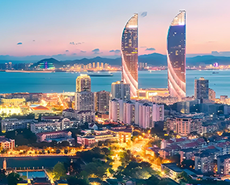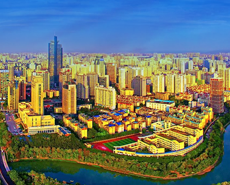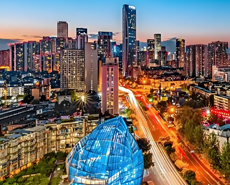Bismuth ingot demand to rise in 2018
----Interview with Wu Shijun
Chairman of the Board
Guixi Grand Sanyuan Industry Group Co., Ltd.
Founded in November 2000, Guixi Grand Sanyuan Industry Group Co., Ltd. (the former name is Guixi Sanyuan Smelting and Chemical Co., Ltd.) is a comprehensive medium-sized enterprise integrated with the production, processing and trading of non-ferrous metals. Covering an area of about 200,000 square meters, the company is located in the industrial park of Guixi with total registered capital of RMB160 million and total assets of RMB1 billion. Its branches include Guixi Sanyuan Smelting and Chemical Co., Ltd., Guixi Sanyuan Science and Trade Co., Ltd. and Guixi Sanyuan Metal Co., Ltd. and its main products include refined bismuth, refined tellurium, matte, bismuth oxide, electrolytic lead, tin ingot and others.
Asian Metal: Hello, Mr. Wu! Thank you very much for accepting the interview of Asian Metal. Firstly, please give us a brief introduction to the main business of your company.
We mainly recycle secondary materials and our main products are bismuth ingot and tellurium metal with an annual capacity of 2,000t of bismuth ingot when we use bismuth ore as raw material. We also purchase some crude bismuth, bismuth-alloy to produce bismuth ingot with the total capacity of 3,000tpy. We produced 70t of bismuth in 2017. In addition, we also recycle lead, copper, gold, silver, platinum and palladium based on the condition of raw materials with unstable output. Generally speaking, our annual outputs of silver, gold, palladium, copper and lead are about 20t, 100-200kg, 100-200kg, 2,000t and 10,000t respectively. In addition, the sales revenue of our company was RMB1.2 billion in 2017.
Thank you for your introduction to your company. Would you like to give us an introduction to yourself?
Actually, I have been engaged in the industry for long time. After graduating from Changsha Environmental Protection College in 1989, I worked for a complementary project of soot under Jiangxi Copper and was responsible for recycling bismuth. Then I left the project and helped others design bismuth plants for two years, which were used for recycling bismuth ores rather than secondary materials. Afterwards, we returned to the original company to do contract business. In 2000, we bought the company and renamed it Guixi Grand Sanyuan Industry Group Co., Ltd. At the very beginning, our annual production capacity of bismuth ingot was as low as 120t, which however reaches over 20,000t after the gradual increase year by year.
Asian Metal: Bismuth ingot prices continued to stand at low levels in China in 2017 and what about the profits of your company during the year?
We made almost no profits in 2017 and even suffered losses in bismuth ingot business. The profit of our company lies in the business of comprehensive recycling and copper is the largest source for us to make profits. With the regular profits of about RMB30 million per year through recycling copper, we only made profits of about RMB20 million in total in 2017 as our copper profits were offset by losses in bismuth business. Among the sales revenue of RMB1.2 billion, the profit was only 20 million, accounting for merely about 1% of the total. We have prioritized the question of how to get through hardships in the past two years rather than make profits.
Asian Metal: Prices of Chinese bismuth ingot have basically been stable at around RMB70,000/t since the fourth quarter of 2017 with difficulties in both increase and decrease. What's the backbone for such stable price in your opinion?
The demand for bismuth ingot has been increasing in recent years, but the increased range has been limited with the overall demand still lower than the output, which is the main reason that makes prices of the material difficult to increase substantially.
The main reason that makes bismuth ingot prices difficult to go down is that producers are generally suffering losses. If prices go down further, no one will be willing to continue the bismuth ingot business. For bismuth ingot producers with bismuth ore as raw material, RMB70,000/t is only the production cost. But there are still some materials of RMB50,000-60,000/t in the market and the reasons are as follow: firstly, some suppliers are forced to sell at lower prices as they are eager to raise money; secondly, for companies like Jiangxi Copper which uses soot as raw material to produce bismuth, production costs for bismuth ingot are only RMB47,000-48,000/t as the soot is a kind of residue produced during smelting copper, and they can make slim profits even at prices of RMB55,000/t with no need to spend money in purchasing raw material. In general, it's unreasonable to sell bismuth ingot at about RMB70,000/t due to difficulties in smelting 1t of bismuth ingot.
We think that prices of bismuth ingot are mainly supported by production costs, but owing to the soft demand and the large output, prices for the material haven't gone up.
Asian Metal: Some market participants predict that more long-term export orders of bismuth ingot would be signed in 2018 compared with the figure in 2017. Do you agree with the opinion?
Exactly speaking, I think the total exports of bismuth ingot in 2018 would decline while those of bismuth oxide would increase affected by China's current tax policy which allows no tax reimbursement for bismuth ingot exports but a rate of 13% to bismuth oxide exports.
The exported bismuth ingot is mainly used in producing downstream products of bismuth oxide, such as bismuth salt. That is to say, there is no difference for importers to import bismuth ingot or bismuth oxide, which makes the exports of bismuth ingot transferred to those of bismuth oxide. Overseas enterprises also change their import sources now. In particular, they can purchase bismuth ingot from Peru and Mexico and bismuth oxide from China. However, in short, the total metal volume of bismuth exports will increase.
Asian Metal: What do you think of the demand for bismuth ingot in 2018 and what is the growth point?
Firstly, we think that the growth point of bismuth ingot demand lies in the replacement of lead after long-time research. In America, the lead content of lead-tin soldering materials in water pipes is required to decrease to 2% from the standard 8%, which makes many soldering materials change to bismuth-tin soldering materials. Yunnan Tin has founded a special company to research and develop bismuth-tin soldering materials. Huawei and other large manufacturing companies have signed purchasing orders with the new company. The consumption of bismuth-tin soldering materials of theses large companies is 700-800tpy now with the possibility to increase to 200tpm in the future. This is the completely increased output. All lead-tin soldering materials used in circuit boards have been changed into bismuth-tin alloy now. Thus, we can say that the demand for bismuth ingot would go up substantially in this aspect in the future.
Secondly, bismuth is also applied in manufacturing the automotive glass, especially in Japan and Europe where about 12% of bismuth is planned to be used in eliminating the air in glass. The original automobile cullet which contains lead and arsenic can cause environmental pollution. We once cooperated with Japan on manufacturing automotive glass which contains 10.98% of bismuth and thus the consumption of bismuth in automotive glass is very considerable.
Thirdly, some companies start to produce oil paint, which used to contain lead, by titanium oxide, selenium dioxide and bismuth oxide at present, especially by yellow bismuth vanadium as it's very beautiful.
Fourthly, there is an uncertain growth point for the demand, which is the application in the national nuclear reactor area. Nuclear power stations were required to locate near large volumes of water to transfer with the heat produced during the reaction. According to a new technology which has been announced publicly in China, lead-bismuth alloy, which contains 54% of bismuth and 46% of lead, can take away the heat which used to be taken away by water; the temperature of water is 0-100° and there is over 2,500° of temperature difference between the melting point (over 200°) and the boiling point (over 2700°) of lead-bismuth alloy. Most importantly, the density of water is 1 while that of lead-bismuth alloy is 10; it's difficult for water to prevent radiation during absorbing the heat while lead-bismuth alloy can prevent the diffusion of the radiation. What's more, the proportion of water is 1 and it's very slow for water to transfer the heat compared with metal. In addition, water can cause pollution while lead-bismuth alloy won't cause pollution. China has made the first order to purchase 50-60t of bismuth ingot for trial production. China plans to construct about 30 nuclear power stations for itself and help other countries construct about 30 ones. The demand of bismuth ingot from these 60 nuclear power stations will be about 180,000t if the demand of one nuclear power station is about 300t. From this aspect, it will also be a growth point for the demand of bismuth ingot in the future.
Lastly, as a variety of green metal, bismuth ingot is friendly to human body and thus can be applied in producing stomach medicines and cosmetics. With the improvement of the living standard, the demand for bismuth ingot in this aspect will also increase.
Asian Metal: Do you have any plans for new projects in 2018?
We plan to apply bismuth needles and bismuth flakes in cosmetics area and steel areas in 2018 respectively. We have completely installed the production equipment for bismuth needles, bismuth flakes and bismuth granules as well as that of bismuth oxide for 600tpy. Meanwhile, we are researching and developing bismuth related products. In addition, as a research and development center of bismuth ingot and tellurium metal, the company will further develop bismuth products in the future.
Asian Metal: Thank you once again for sharing your opinions with us and offering your supports to Asian Metal. Wish your company a brighter future.
















